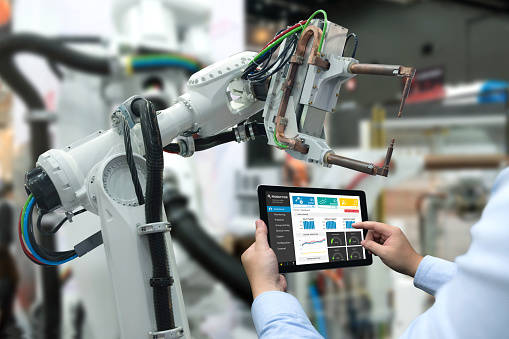Robots taketh away and robots giveth

If you’re getting all tied up in a knot because you think robots are going to take your job, calm down, take a deep breath, have a drink or do whatever you need to do to regain control. Now read on.
In 1859, when we lit our homes and street lamps with whale oil, something monumental happened in Titusville, a small town in northwestern Pennsylvania. Oil was discovered, and instantly, the world changed.
For chemists who were in the business of clarifying kerosene from whale oil (mostly in southern New England and New York) — and who didn’t see the possibilities — their jobs and businesses were rendered obsolete and their livelihoods were gone, as the need for whale oil vanished in less than a decade.
One chemist, however, Robert Cheseborough, saw things differently. Curious, he traveled to Titusville and found that, as the oil was extracted from the ground, a gooey substance formed around the base of the wells. Interestingly, workers used this jelly-like stuff to treat their wounds and burns.
Cheseborough collected as much as he could, brought it back to his laboratory, clarified it and, before you know it, gave the world one of the most widely used health products ever invented: Vaseline Petroleum Jelly. He went on to found, in 1872, what was to become Cheseborough-Ponds, one of the worlds leading manufacturers of personal care products.
Three things happened back then. One, those in the whale oil business who didn’t see the new direction were done. Two, the fossil fuel business, especially oil, created countless jobs all over the place. And three, a whole new industry, which has perpetuated for a century and a half and counting, was formed.
Now, which was larger? The number of people who lost whale oil-related jobs or the number of people who went to work for oil companies or Mr. Cheseborough? Not even close.
Not too long after that, another small bunch of businessmen felt threatened by a new advancement. The endangered species this time was the small buggy whip manufacturing industry. The automobile, they complained, was replacing the vehicle for which they made an important accessory.
OK, let’s do the same exercise: Which was greater, the loss of buggy whip jobs or the gain in the automobile industry? Right.
Fast forward. In August 1981, IBM introduced their model 5150, world’s first personal computer, and everyone was running around like Chicken Little, saying the sky was falling. The PC was going to take away everyone’s job. Well?
What all these events had in common was as follows: They created far more jobs than they eliminated. They created better jobs than they eliminated. They created jobs that required better education and training than the ones that were eliminated.
No one knew what many of those jobs were going to be before they got here and those who made necessary changes did just fine — thank you very much — while those who didn’t, didn’t.
Do you think the robot thing is going to be any different? Absolutely not; there’s enough precedent here. While many reports are predicting how many U.S. jobs will be eliminated — and some of them are throwing around some crazy numbers, like one-third of all jobs, even 38 percent — they’re missing the whole point.
In fact, there’s already proof that robots will foster job creation. For instance, according to the International Federation of Robotics, the U.S. automotive industry installed more than 60,000 industrial robots between 2010 and 2015. During this same period, employment in the U.S. automotive sector increased by 230,000. Similar trends are evident in Germany, another major economy with a robust automobile industry.
On a larger scale, the McKinsey Global Institute states that more than 90 percent of jobs will not be fully automatable in the future. Instead, robots and humans will work together, with robots not only complementing human labor but, also, by taking over lower-level functions, create the need for humans to assume higher-level tasks and thereby earn higher incomes.
So, yes, just like with whale oil, buggy whips and computers, there will be great changes. But the issue will not be job loss; it will be job shift, job transformation, job growth and job elevation.
And don’t just think about the robots. Think about all the needs they will create: legal, compliance, organizational design, software development, training, security and so forth — all creating new jobs.
Indeed, robots may taketh, but surely shall they giveth.
But like Mr. Cheseborough, we have to be curious and ready.
Career coach and corporate adviser Eli Amdur has been authoring his weekly “Career Coach” column since 2003 and is the author of his acclaimed career advice book “It’s Not So Far From Here to There: The thinking person’s guide to well-managed career.” Adjunct professor of two graduate-level leadership courses at Fairleigh Dickinson University in New Jersey, he also is active on the speaker circuit, delivering presentations on today’s critical employment and leadership issues. Visit his website at www.amdurcoaching.com.